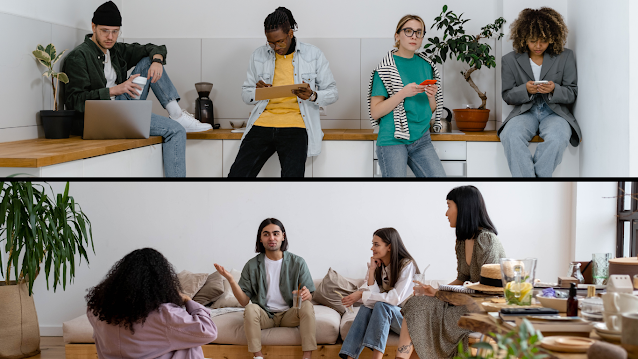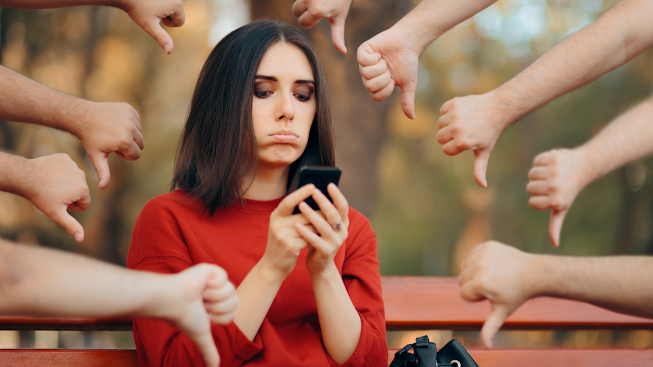Declining social skills of the young generation being affected by extreme exposure to social platforms
The advent of social media
platforms has revolutionized the way people communicate, connect, and share
information. Social media has brought about significant changes in the way
people interact with each other, and has given rise to a new generation of
digital natives who have grown up with constant access to the internet and
social media platforms. However, the extreme exposure to social media platforms
has resulted in a decline in the social skills of the young generation.
Social media has made it easier
for people to connect with others and to stay in touch with friends and family.
However, it has also made it easier for people to avoid face-to-face
interactions, and to communicate through screens rather than in person. This
has led to a decline in social skills, as young people are becoming
increasingly less adept at reading social cues and communicating effectively in
person.
One of the main reasons for the
decline in social skills is that social media platforms have made it easier for
young people to avoid face-to-face interactions. Instead of meeting up with
friends or classmates, young people are more likely to communicate through
social media platforms such as Facebook, Twitter, and Instagram. While this may
seem like a convenient way to stay in touch, it can also be a barrier to
developing social skills.
Another factor contributing to the decline in social skills is the way social media platforms have changed the way people communicate. Social media platforms tend to encourage short, quick messages and sound bites, rather than long, thoughtful conversations. This can make it difficult for young people to develop the patience, listening skills, and empathy that are necessary for effective communication.
In addition, social media platforms can also create a false sense of intimacy and closeness. Young people may feel like they know someone well based on their social media profile, but in reality, they may have never even met the person in person. This can make it difficult for young people to navigate real-life social situations and build meaningful relationships.
The decline in social skills
among young people can have serious consequences for their future success and
happiness. Effective communication and social skills are important in all
aspects of life, from school and work to personal relationships. Without these
skills, young people may struggle to form and maintain healthy relationships,
and may have difficulty succeeding in their careers.
In conclusion, while social media
platforms have brought many benefits, they have also had a negative impact on
the social skills of the young generation. It is important for young people to
recognize the potential negative effects of social media and to make an effort
to develop their social skills through face-to-face interactions and other
means. By doing so, they can improve their communication skills, build
meaningful relationships, and increase their chances for success and happiness
in life.
Certainly, there has been a
significant amount of research conducted in recent years on the effects of
social media on the social skills of young people. Here are some examples of
recent studies that highlight the negative impact of social media on social
skills:
- A study published in the Journal of Adolescence in 2021 found that excessive social media use was linked to lower levels of social competence in adolescents. The study found that social media use was associated with decreased levels of empathy, perspective-taking, and social initiative, all of which are important components of social competence.
- A study published in the Journal of Social and Personal Relationships in 2020 found that social media use was associated with lower levels of intimacy and relationship satisfaction in romantic relationships. The study found that young adults who spent more time on social media reported feeling less emotionally connected to their partners and less satisfied with their relationships.
- A study published in the Journal of Applied
Developmental Psychology in 2018 found that social media use was linked to
lower levels of social skills and higher levels of loneliness in college
students. The study found that students who spent more time on social
media reported feeling less confident in their social skills and more
isolated and lonelier.
These studies, along with many
others, suggest that social media use is associated with a decline in social
skills among young people. While social media has many benefits, it is
important for young people to be aware of the potential negative effects and to
make an effort to balance their online and offline interactions.
However, there are efforts to bring the people and communities
closers, and within reach for personal interactions and personal engagements in
the hyperlocal by apps such as Netclan Explorer . This app tries to
bridge the gaps between long distance and anonymous interactions and promotes
the more personal interactions and engagements of the users in their own
hyperlocal areas by broadcasting the user’s profile and allowing other users to
view, decide and connect with the fellow community members through a safe
process of Invite- Accept.
Connections in the hyperlocal are more meaningful and engage
the users in direct personal interactions thereby inculcating social skills,
community feeling, compassion and sharing among the people which is a must for
fighting the ill effects of the social platforms.

.png)
.png)
.png)
.png)
Comments
Post a Comment